
"Mr. Roboto" is a song by American rock band Styx, released as the lead single from their eleventh studio album, Kilroy Was Here (1983). It was written by band member Dennis DeYoung. In Canada, it went to number one on the RPM national singles chart. It entered on both the US Billboard Hot 100 and US Cash Box Top 100 on February 12, 1983. On April 30, the song peaked at number three on Billboard, but fared better on Cash Box, where it reached number one.
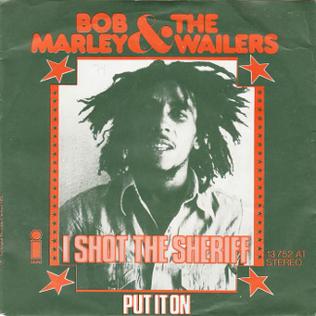
"I Shot the Sheriff" is a song written by Jamaican reggae musician Bob Marley and released in 1973 with his band the Wailers.

"You Keep Me Hangin' On" is a song written and composed by Holland–Dozier–Holland. It was first recorded in 1966 by American Motown group the Supremes, reaching number one on the Billboard Hot 100.

"Feelin' Satisfied" is a song by American rock band Boston, released on their 1978 studio album Don't Look Back. The song was written by Tom Scholz and released as a single in 1979. The single peaked at #46 on the US Billboard Hot 100. It reached #84 in Canada. It was the band's last release for 7 years, until Third Stage in 1986.

"Barracuda" is a song by American rock band Heart, released in 1977 on their third studio album, Little Queen, and was released as the album's lead single. The song peaked at number 11 on the Billboard Hot 100. In 2009, "Barracuda" was named the 34th-best hard rock song of all time by VH1.

"Piece of My Heart" is a romantic soul song written by Jerry Ragovoy and Bert Berns, originally recorded by Erma Franklin in 1967. Franklin's single peaked in December 1967 at number 10 on the Billboard Hot Rhythm & Blues Singles chart in the United States.
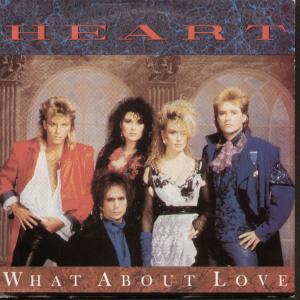
"What About Love" is a song originally recorded by Canadian rock band Toronto in 1982. It was later recorded by American rock band Heart in 1985 and was released as the first single from the band's self-titled album, Heart. The band's "comeback" single, it was the first Heart track to reach the top 40 on the Billboard Hot 100 in three years, and their first top 10 hit in five. The song was also their first hit single on their new record label, Capitol Records. Grace Slick and Mickey Thomas, co-lead vocalists of Starship at the time, provide additional background vocals on the song.

"Need You Tonight" is a song by the Australian rock band INXS, released as the first single from their 1987 album, Kick, as well as the fourth song on the album. It is the only INXS single to reach No. 1 on the Billboard Hot 100. It also achieved their highest charting position in the United Kingdom, where the song reached number two on the UK Singles Chart; however, this peak was only reached after a re-release of the single in November 1988. On its first run on the UK charts in October 1987, it stalled at No. 58. It was one of the last songs recorded for the album, yet it would arguably become the band's signature song.
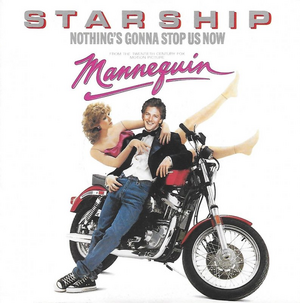
"Nothing's Gonna Stop Us Now" is a song co-written by Diane Warren and Albert Hammond and recorded by American rock band Starship for their second studio album, No Protection (1987). It is a power ballad duet featuring vocalists Grace Slick and Mickey Thomas and is the theme to the romantic-comedy film Mannequin.
"Don't Turn Around" is a popular song written by Albert Hammond and Diane Warren. It was originally recorded by American singer Tina Turner and released as the B-side to her 1986 hit single "Typical Male". It has since been included on Turner's compilation album The Collected Recordings: Sixties to Nineties (1994), as well as featuring in the Tina musical since 2018.

"These Dreams" is a song by American rock band Heart from their 1985 self-titled eighth studio album. It was released on January 18, 1986, as the album's third single, becoming the band's first song to top the Billboard Hot 100. The single's B-side track "Shell Shock", was also the B-side of Heart's previous single "Never".
"Alone" is a song composed by Billy Steinberg and Tom Kelly, who recorded it under the name i-Ten on their 1983 album Taking a Cold Look. It was later recorded by actress Valerie Stevenson and actor John Stamos on the original soundtrack of the CBS sitcom Dreams in 1984. American rock band Heart covered it on their 1987 album Bad Animals, and this version reached number one in the US and Canada. In 2007 Celine Dion recorded it for her album Taking Chances. In 2010 Alyssa Reid used the music and lyrics for the chorus of her song "Alone Again".

"I Didn't Want to Need You" is a song by American rock band Heart. It was composed by veteran songwriter Diane Warren and released as the second single from the band's 10th studio album, Brigade (1990). "I Didn't Want to Need You" peaked at number 23 on the US Billboard Hot 100, number 21 on the US Cash Box Top 100 and number 14 on the Canadian RPM 100 Hit Tracks chart. It also reached the top 40 in Ireland and Sweden and number 47 on the UK Singles Chart.

"Talk Dirty to Me" is a single from American glam metal band Poison. Released on February 18, 1987, it was the second single from their debut album Look What the Cat Dragged In. The song peaked at No. 9 on the Billboard Hot 100, becoming the band's first top 40 hit in the United States and establishing Poison as one of the top-selling rock acts of the decade.
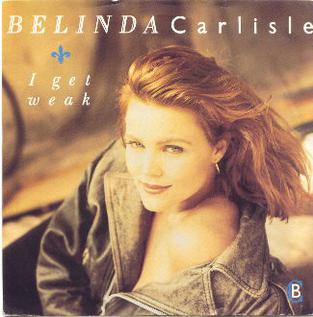
"I Get Weak" is a song by American singer Belinda Carlisle from her second studio album, Heaven on Earth (1987). Written by Diane Warren and produced by Rick Nowels, the song was released as the second single from Heaven on Earth in January 1988. "I Get Weak" reached number two on the US Billboard Hot 100, behind "Never Gonna Give You Up" by Rick Astley, number four on Canada's RPM 100 Singles chart, and number 10 on the UK Singles Chart. The track features background vocals by Carnie Wilson of Wilson Phillips.
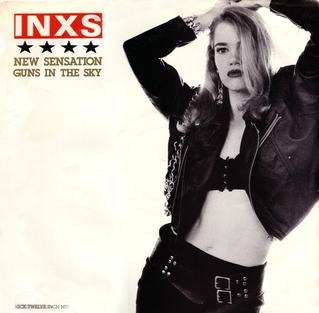
"New Sensation" is a song by Australian rock group INXS. It was the third single released from their sixth studio album, Kick (1987). The music was composed by Andrew Farriss and the lyrics were written by Michael Hutchence. The song features a signature Kirk Pengilly sax solo and lyrics about a partying lifestyle.

"The Long Run" is a song written by Don Henley and Glenn Frey and recorded by the Eagles. The sound of the song is viewed as a tribute to the Stax / Memphis rhythm and blues sound. It was the title track of their album The Long Run and was released as a single in November 1979. It reached No. 8 on the U.S. Billboard Hot 100 in early 1980. It was the second of three singles released from The Long Run album, preceded by "Heartache Tonight," which reached No. 1 on the Billboard Hot 100 in November 1979, and followed by "I Can't Tell You Why," which also reached No. 8 on the Billboard Hot 100, in the spring of 1980.

"I Hate Myself for Loving You" is a song by American rock band Joan Jett and the Blackhearts, released as the lead single from their sixth studio album, Up Your Alley (1988). The song reached number eight on the US Billboard Hot 100, Jett's third and last single to reach the top 10, and was her first since "Crimson and Clover" in 1982. The song spent six weeks longer on the charts than did the group's biggest hit, "I Love Rock 'n' Roll". On September 10, 2011, the single reached number 39 on the US Rock Digital Songs chart.
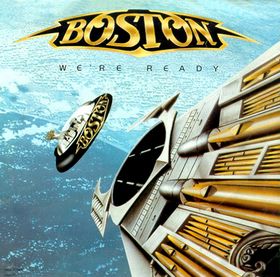
"We're Ready" is a song by American rock band Boston written by founder, lead guitarist and primary songwriter Tom Scholz. It was first released on the band's third studio album Third Stage (1986).

"Can'tcha Say ", also known as "Can'tcha Say /Still in Love" or "Can'tcha Say" is a song written by Tom Scholz that was released by Boston on their 1986 album Third Stage. It was released as the third single from the album and reached #20 on the Billboard Hot 100, making it their last Top 40 hit in the United States. It also reached #7 on the Billboard Mainstream Rock chart and #27 on the Cashbox chart. In Canada, the song peaked at #88.

















